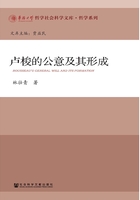
Abstract
Rousseau’s general will has been confusing us for more than two hundred years. In 1947,Jouvenel interpreted Rousseau’s general will as “the collectivizing of self-love(amour de soi)” in a noteworthy essay investigating the unity of Rousseau’s thought. However,few experts researching on Rousseau’s thought have developed Jouvenel’s view of Rousseau’s general will. We,therefore,following Jouvenel,endeavor to understand the general will as the extension of amour de soi(self-love)in a certain political community.
In the Discourse on the Origin and Foundations of Inequality Among Mankind,Rousseau discovered a universal dilemma of human existence,viz.,the conflict between amour de soi and amour-propre(self-esteem). If this conflict is not seriously treated by the regime,it will necessarily develop into the conflict between amour de soi and political duty in political life. Therefore,it raises a question about the criterion of judging whether or not the regime is moral,i.e.,whether the regime deepens the conflict or attempts to solve the conflict. We believe that the intention of Rousseau’s the general will was to avoid such a conflict in the regime. These constitute the main content of chapter Ⅱ.
Since the conflict between amour de soi and amour-propre is a necessity,how could a regime settle this conflict? We need to discuss the dimension of the extensibility of amour de soi and amour-propre so as to solve the conflict. Through the discussion,we discover that the human being is a relative being at his very beginning,who has the capacity of empathizing himself into the others,viz.,the extensibilities of amour de soi,including amour-propre. We assert that the extensibilities is the capacity of general will forming in the political community. But,we have to discuss the condition in which the extensibility of amour de soi and amour-propre function,so that the conflict between amour de soi and external political duty can be avoided and the extensibility of amour de soi and amour-propre can be transformed into general will in the political community. Through analyzing the three kinds of state of nature,we come to the point that the condition of forming general will is to make the regime imitate natural freedom. These are the main content of chapter Ⅲ.
By elaborating the possibility and condition of forming general will,we find that the formation of general will has a huge dilemma:for one thing,human being is a relative being at his very beginning,who can empathize himself into the others. This capacity helps human beings to form an spontaneous association,such as the Golden Age;for the other,the relativity of human being can also form a different association,i.e.,the combination of disposition and external political duty,such as the capital society which Rousseau criticized heatedly. Thus,the problem of forming the general will turns out to be how to reshape the association of individuals in the regime. This association can either promote to expand amour de soi and transform amour-propre into virtue,or further corrupt amour de soi,or even make amour-propre evil. What is at issue is how to found a regime,which can protect the extensibilities of amour de soi and amour-propre. We take the view that the way Rousseau solved the problem is to maintain natural freedom in the association which aims at developing the recognition elements of amour de soi and amour-propre;and the aim of natural freedom is to avoid dependence among human beings and prevent the generation of private will.
We,therefore,have to ponder what it means “to associate and to maintain freedom” said by Rousseau in the Social Contract. From analysis,we think that the aim of association is to form the general will in the political community,and that of freedom is to guarantee the formation of the general will. However,Rousseau discussed the problem of association in the language of social contract,therefore,we need to discuss how social contract creates natural freedom in the process of association. By analyzing the clauses of social contract,we hold the view that the clauses of Rousseau’s social contract show the character of natural freedom,and that the essence of social contract is to construct a sovereign community which aims at forming sovereign authority so as to maintain the general will’s forming condition—natural freedom. The formation of sovereign authority depends on every sovereign’s amour de soi,which guarantees the eternal rightness of sovereign authority,on one hand;the sovereign community should also be given a power which can fight against all kinds of group’s private will,on the other hand. This kind of power is the contemporariness of sovereign will.
But the political association is a man-made community. Compared with the consistency of individuals’ action power and action will,this man-made community could not make naturally its power work in accordance with its action will. Therefore,in order to form the general will in the political community,an intermediate body that is the combination of action will and action power needs to be arranged in the regime based on the “scale of the state”,viz.,the distance of private will and the general will. And this intermediate body is government. Though Rousseau’s government provides a possibility of forming the general will,he also believe that any form of government has a possibility of destroying the general will. Hence,we discuss how the private will of government comes about and the way of avoiding it. These are the main content of chapter Ⅳ.
Last,on the basis of our understanding of Rousseau’s general will,we attempt to clarify two prevailing views of the general will,i.e.,the relation of the general will to public benefits and the relation of the general will to voting. The purpose is to further demonstrate our understanding of Rousseau’s general will.